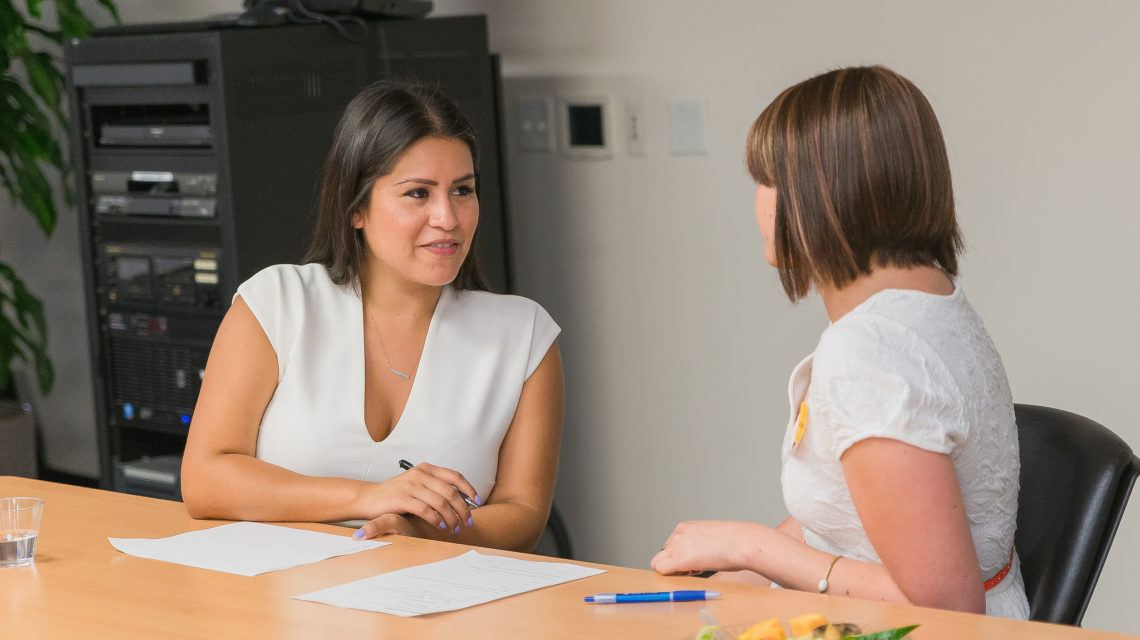By Career Center
University of Southern California —
Different Types of Interviews
As you will see below, there are many different types of interviews. Once you are selected for an interview, you may experience one or more of the situations described below. When you schedule an interview, try to get as much information as possible about whom you will be meeting. Note that it is rare to have only one interview prior to a job offer. Most employers will bring back a candidate a number of times to be sure a potential employee will fit into the company culture.

Traditional Face-to-Face Interview
- Most interviews are face-to-face. The most traditional is a one-on-one conversation.
- Your focus should be on the person asking questions. Maintain eye contact, listen and respond once a question has been asked. Do not interrupt the interviewer.
- Your goal is to establish rapport with the interviewer and show them that your qualifications will benefit their organization.
Panel/Committee Interview
- In this situation, there is more than one interviewer. Typically, three to ten members of a panel may conduct this part of the selection process. This is your chance to put your group management and group presentation skills on display.
- As quickly as possible, try to ‘read’ the various personality types of each interviewer and adjust to them. Find a way to connect with each interviewer.
- Remember to take your time in responding to questions. Maintain primary eye contact with the panel member who asked the question, but also seek eye contact with other members of the panel as you give your response.
Behavioral Interview
What is a Behavioral Interview?
Behavioral interview questions have become more and more popular over the last few years. Many employers use a combination of behavioral and traditional interview questions to select students for internships and full-time jobs. The method of behavior-based interviewing is a way to screen candidates and get more tangible information from potential hires. The basic premise behind this type of interview is that your past behavior is the best predictor of your future performance and actions in the workplace. These types of questions may be asked in any interview format—telephone, skype, panel, or one-on-one. You should be prepared to answer a few behavioral-based questions during your interview.
What Employers are Looking for in a Behavioral Interview
Employers use behavioral interview questions as a gauge to determine your actions in the workplace. When an employer asks a behavior-oriented question, they are no longer asking hypothetical questions and therefore expect specific and detailed answers based on facts. In other words, the interviewer is looking for results, not just an activity list. They are listening for specifics, such as names, dates, places, the outcome and most importantly, your role in achieving that outcome.
Sample Behavioral Interview Questions
Most behavioral interview questions begin with the words, “Give me an example of …” or “Tell me about a time when …” or “Describe a situation where …”. Some sample questions you might expect include:
- Tell me about a time when you succeeded as part of a team, and give specific examples.
- Give me an example of a time when you failed.
- What is your typical way of dealing with conflict? Give me an example.
- Give me an example of a time when you set a goal and were able to achieve it.
- Describe your plan of action to solve a problem.
- Tell me about the type of people you have a hard time dealing with.
- Give me an example of when you showed initiative and took the lead.
- Tell me about a time when you had to do multiple things at the same time. How did you handle it?
- Give me an example of a time when you motivated others.
- Describe a situation where you had to work with someone who was difficult to get along with. How did you resolve the issue?
- Give me a specific example of a time when you used good judgment and logic to solve a problem.
- Tell me about a challenging assignment you worked on and describe how you completed the assignment.
- What are three successful leadership qualities you think are important? How have you demonstrated these qualities in different situations?
- Tell me about a recommendation you had to improve a business or organization process. How did you move that idea forward?
How To Prepare For A Behavioral Interview
In anticipation of a behavioral interview, we suggest you be prepared to discuss three to five accomplishments or projects. Reflect on these occasions and know all the details in the event that the interviewer asks follow up questions for clarification. Oftentimes, one scenario can answer various behavioral questions. For example, the project in which you succeeded as part of a team could also be the time when you solved a complex problem. Feel free to use the same example to answer different behavioral questions. However, do not use only one example throughout an entire interview. Utilizing examples from various facets of your life—from academic to professional to student leadership/community service—allows you to appear better rounded and three-dimensional to the employer during the interview process. Most behavioral interview questions come directly from the job description. Take note of the types of skills the employer lists as qualifications or requirements in a job posting. Most likely, the interviewer will ask questions that directly link to those expectations.
Use The STAR Method In A Behavioral Interview
In answering behavioral questions, consider using the popular “STAR” method. Most people find the “STAR” method helpful because it helps them organize their answers. “STAR” is an acronym which stands for:
- The Situation (be specific)
- Your Task/Role in the project
- The Actions you took
- The Results, i.e. what happened (the positive accomplishment)
There will be instances when interviewers want to know about your failures or projects you were less successful with (i.e. “Tell me about a time when you failed”). Should this occur, make sure to include a response that signifies what you learned from the failure and how your behavior has changed AND been applied to other experiences. This extra step helps emphasize your willingness to learn and change while demonstrating your initiative.
Case Interview
- In some interviews, you may be asked to demonstrate your problem-solving skills. The interviewer will outline a situation or provide you with a case study and ask you to formulate a plan that deals with the problem.
- You do not have to come up with the ultimate solution. The interviewers are looking for how you apply your knowledge and skills to a real-life situation. Speak and reason aloud so interviewers have a full understanding of your thought process.
- Before answering a case interview question, be prepared to ask the employer numerous questions for clarity and informational purposes. Most employers will provide responses that could result in additional inquiries.
- The more you are able to analyze and dissect the case study, the more you will likely impress your interviewer.
- This is the only interview for which it is acceptable, even encouraged, to bring a pad of paper and pencil. Most interviewers will allow you to take notes and jot down thoughts as you work through the case.
Telephone Interview
- Many organizations will conduct interviews by telephone to narrow a field of candidates. Telephone interviews may also be used as a preliminary interview for candidates who live far away from the job site.
- It is important to treat this interview as you would a face-to-face connection. Arrange for a quiet space and time to schedule the conversation. Clear a work surface to minimize distractions.
- Focus on the conversation. Listen to the questions carefully before you answer. Since your voice is key, convey energy with inflection in your voice. Smiles can be heard!
- Have a copy of your resume and the job description nearby as a reference.
- Avoid using a phone with call waiting. You do not want to be interrupted during a phone interview.
- Try to use a landline phone or a cell phone that is not prone to dropping calls.
- Find a quiet space where interruptions can be avoided.
Skype/Video Interview
Video Interviews are gaining popularity amongst employers for a variety of reasons. Video interviews allow companies to pre-screen candidates, eliminate travel costs when interviewing candidates from various locations, and increase the number of interviews they can conduct in a day.
There are two types of video interviews. Live Video Interviews are very similar to in-person interviews. Employers and candidates are able to interact via video technology platforms, such as Skype and Google Hangout.
In an On-Demand Interview, a series of prompts or questions will appear on the screen and candidates will be given the opportunity to record their responses without interacting with an interviewer. These can often be completed on a candidate’s own schedule. Both types should be treated the same as an in-person interview.
How To Prepare For Skype/Video Interviews
- To avoid technology issues, test your video and audio before an interview to ensure everything is working properly. If the audio quality is poor, consider investing in a separate headset/microphone.
- Turn off email alerts, software updates, and other notifications that may distract you or show up on the screen during the interview.
- Make sure your laptop or tablet is fully charged. You do not want it to die during your interview.
- Dress professionally from head to toe. If you have to move from your seat, you do not want to show the interviewers your pajama bottoms or sweatpants.
- Make sure your background is professional and free of distractions that could pull the attention away from you.
- Organize your resume, cover letter, information about the company, questions you want to ask the employer, and potential talking points around your screen so that you do not have to look away from the screen or shuffle through papers (which can be heard on your microphone).
- Eye contact is critical in a video interview. Avoid looking at yourself in the viewfinder and focus on looking into the webcam. This will give the illusion that you are making direct eye contact with the interviewer.
- The video connection could be delayed so to avoid talking over your interviewer, let the interviewer finish the question and then pause for a few seconds before delivering your answer.
- Enlist the help of a friend or relative to do a practice Skype/video interview. Prepare exactly as you would for the day of the interview. Dress appropriately, have your materials set up, etc. Have your friend provide you feedback on the lighting, sound, and background, as well as your appearance, voice tone and pitch, and body language.
Group Interview
- A group interview is usually designed to uncover the leadership potential of prospective managers and employees who will be dealing with customers.
- The front-runner candidates are gathered together in an informal, discussion-type interview. A subject is introduced and the interviewer will start off the discussion.
- The goal of the group interview is to see how you interact with others and how you use your knowledge and reasoning to influence others.
Lunch/Dinner Interview
- The same rules apply at a meal as those in an office. The setting may be more casual, but remember that it is a business meal and you are being watched carefully.
- Use the interview to develop common ground with your interviewer. Follow your interviewer’s lead in both the selection of food and etiquette.
- Avoid messy foods and do not drink alcohol at any point in this part of the interview process.
Stress Interview
- This form of interview was more common in sales positions and is rare today. However, you should be aware of the signals. The stress interview is usually a deliberate attempt to see how you handle yourself under pressure.
- The interviewer may be sarcastic or argumentative, or may keep you waiting. Do not take it personally. Calmly answer each question. Ask for clarification if you need it and never rush into an answer.
- The interviewer may also lapse into silence at some point during the questioning. This may be an attempt to unnerve you. Sit silently until the interviewer resumes the questions. If a minute goes by, ask if the interviewer needs clarification of your last comment.











